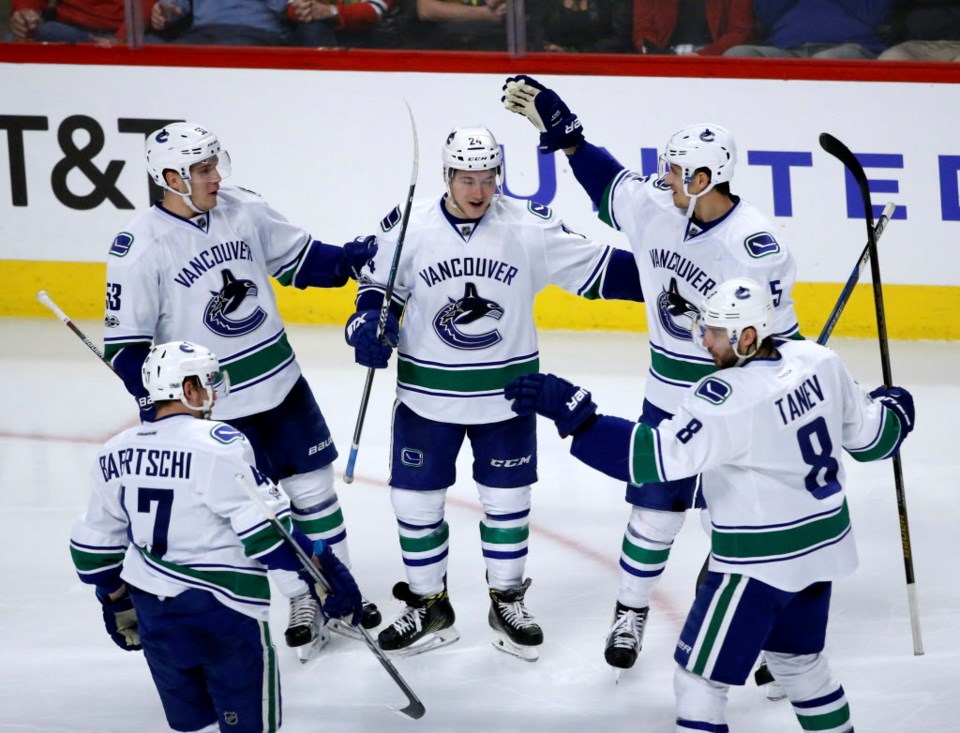The Canucks managed to avoid salary arbitration with Michael Chaput by acceding to what was likely his number one priority: a one-way contract. That’s a massive get for Chaput, as even his near-league-minimum salary is around three times as much as his likely AHL salary would have been on a two-way contract.
Like Chaput, Reid Boucher filed for arbitration and he’s likely looking for the same thing: a one-way contract that will ensure he makes NHL money if he gets sent down to the AHL. Considering he was waived three times last season, that’s an understandable concern.
The Canucks, on the other hand, likely want to avoid giving Boucher a one-way contract, as they have two younger wingers that they would want to get in the lineup ahead of him: Brock Boeser and Nikolay Goldobin.
While Boucher showed some potential at times last season, particularly on a line with Bo Horvat and Sven Baertschi, he’ll be hardpressed to earn a spot on that line in training camp against the likes of Boeser, Goldobin, and the newly-signed Sam Gagner.
That said, there’s a lot to like about Boucher. He’s proven all he can at the AHL level, putting up 32 points in 34 games in 2015-16 and racking up 4 goals and 5 points in a brief 5-game conditioning stint last season. The trick is proving that he can put up points in the NHL and he’s been given little opportunity to do so.
Boucher started last season with the New Jersey Devils after scoring 19 points in 39 games in the previous season. But he has minimal ice time and, after just 2 assists in 9 games, the Devils waived him and he was claimed by the Nashville Predators. He managed 1 goal in 3 games with the Predators, but he was waived once again.
The Devils claimed him off waivers, then put him back on the waiver wire immediately, hoping to send him to the AHL. Instead, the Canucks plucked him off waivers and put him in the lineup, giving him some opportunities in the top-six and on the power play. He finished the season with 5 goals and 7 points in 27 games with the Canucks.
The biggest thing to like about Boucher is his finishing ability, as he has a hard and accurate wrist shot that makes him a danger to score from the top of the faceoff circle on the power play. He can finish in other ways as well, whether it’s cleaning up rebounds around the net with his quick hands or tucking the puck five-hole on the backhand.
The problem is that he probably needs to play in the top-six, as he has defensive flaws and lacks size, and it’s unclear whether he can score enough to justify a top-six role. At 5-on-5, Boucher was 8th on the Canucks in points per hour, just ahead of Goldobin, but behind Boeser in his 9-game stint.
Still, Boucher has shown flashes of potential and might be worth stashing on the fourth line with a role on the second power play unit, with the option of moving him up the lineup if he performs well or if there are injuries. In that case, he would be worth a one-way contract. Frankly, for what he produces at the AHL level, he’s likely worth a one-way contract even if he does end up in Utica.
In terms of a dollar amount, we can look at what similar players received on their recent contracts. Boucher’s production so far in his career — 37 points in 112 games — puts him in similar territory to Marko Dano, Scott Laughton, and Nick Cousins. That gives us a range of Average Annual Values (AAV) from $850,000 to $1,000,000.
He’s actually not far off from Markus Granlund when he signed a new contract with the Canucks after being traded in 2016. At that point, Granlund was 23 years old and had 31 points in 102 games. He signed a two-year contract worth $900,000 per year.
That seems like a reasonable place for the 23-year-old Boucher to start, but without Granlund’s more refined two-way game, that’s unlikely where he finishes. A one-year, one-way contract worth $850,000 seems like the most likely outcome.



